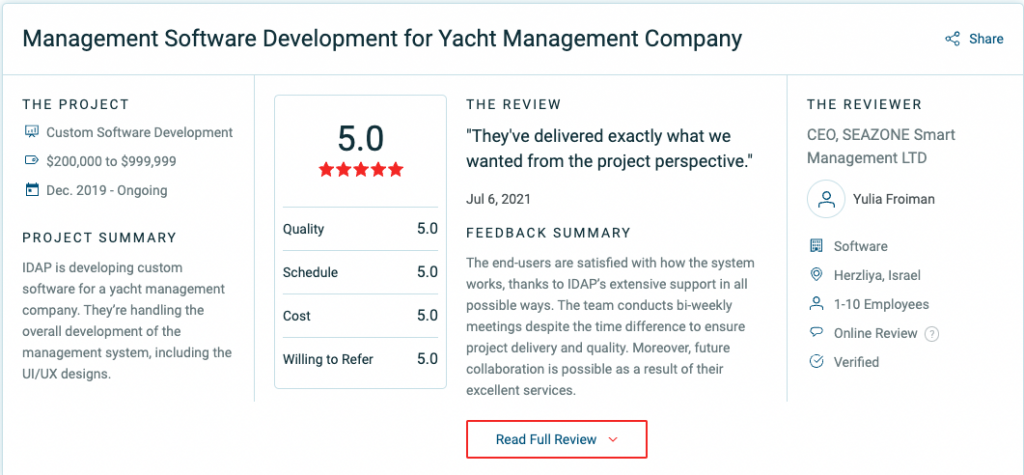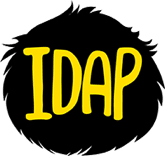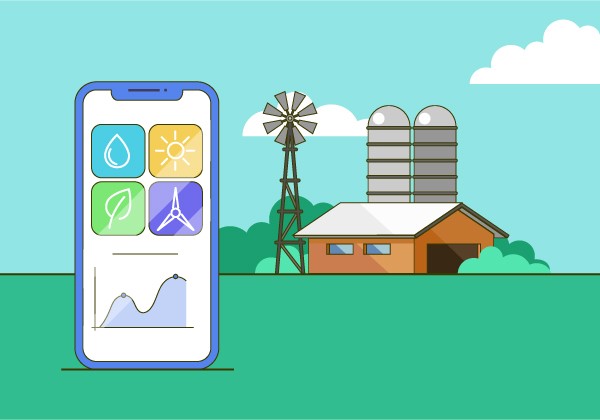Thinking about building software for your agricultural business?
Or looking to learn about the benefits of agricultural software?
Below, you’ll find a beginner’s guide to agriculture app development, its steps, benefits for businesses, as well the cost of such projects. Also, you’ll find tips on finding a reliable software development service for your agricultural application project.
In this post:
- What is application development in agriculture?
- Steps to develop agriculture software
- Types of agricultural software and apps
- How to hire a reliable agritech app development company
- The cost of agriculture software development
Considering getting software for your agricultural business to improve efficiency?
What is Agriculture App Development?
Agriculture app development is a process of creating mobile apps and software tailored to address the needs of agricultural businesses. This process typically involves collaboration between two parties: an agriculture software development service (including the project management and the dedicated development team) and the client (an agricultural business).
Agriculture App Development: The Steps
There are a few steps involved in a typical process of developing software.
The process of any agriculture software development begins with the client describing their needs to the technology partner. Like with any other business project, the quality of collaboration and expertise play a key role in ensuring the best possible outcome.
So, here are the steps:
- Collecting and analyzing requirements. The client and the app development company collaborate to understand your specific needs and challenges of the project. This stage involves detailed discussions, data collection, and problem identification to define the future app’s objectives and features.
- Design and planning. Once the agricultural app development company has a comprehensive understanding of the requirements, it proceeds to design the app’s architecture, user interface, and feature set. This involves creating wireframes and mockups of the future app (read more about the design phase).
- Software development. Software developers create the code for the app, transforming the design into a fully functional digital product. Apart from coding, this phase of agriculture app development also involves some testing and optimization of the app’s performance (read more about dedicated software development teams)
- Testing. Here, developers share their work with quality testers, who perform various types of software tests, including functional, performance, and security testing, to find any issues. Also, the client is often involved in testing to ensure that the app fully meets their needs.
- Deployment and support. The finished product is deployed to be ready for use. The app development company provides training if necessary to ensure that the client can effectively use the app. Additionally, they can also provide ongoing technical support and maintenance to address any questions, issues, or future software updates.
Learn more about the process of developing software: Custom mobile app development process.
Common Types of Agricultural Apps and Software
Some of the most common types of agricultural software include farm management, livestock management, crop monitoring, and accounting.
Farm management
Farm management software serves as a centralized platform for farmers, streamlining their daily activities. It encompasses features for assessing profitability, expense tracking, crop production monitoring, livestock record-keeping, and more.
By integrating record-keeping, planning, management, tracking, sales, and reporting tools, this software simplifies the entire farm management process. This way, farmers can operate their businesses more efficiently.
Livestock management
Livestock management software is designed to assist farmers and livestock producers in efficiently managing their livestock operations. This software helps track and monitor the health, breeding, nutrition, and overall well-being of animals.
For example, poultry businesses can use livestock management software to get information such as daily egg yield, historical egg production, and production comparison in one dashboard. These visual representations offer a clear and concise overview of key metrics, facilitating efficient analysis and decision-making.
Crop monitoring
Crop monitoring software is a solution that helps track the health and condition of crops both in real time and using historical data. This software combines the software part (a computer program) and hardware (sensors on the field).
Crop monitoring software can help protect crop health by detecting issues such as pest infestations, diseases, and water stress. It also records field data to generate economic analysis and real or projected profit evaluations.
Related: AI in agriculture: benefits and examples.
Agricultural accounting
Agricultural accounting software is a specialized software designed to help farmers track and manage income, expenses, and inventory. This software simplifies tasks like budgeting, tax compliance, and financial analysis, providing insights into profitability.
Using such software helps maintain accurate inventory records, preventing overstocking or shortages, and optimizing resource allocation.
Note
Developing custom software will allow you to combine the features of different agricultural applications (say, livestock management and accounting in one). Besides, you can have custom software developed for your industry; for example, a winery management software that includes winery management, HR management, and cost analysis features.
Have a software idea in mind?
Get in touch with IDAP, a top-rated custom software development company.
Application Development in Agriculture: How to Hire a Reliable Partner
Finding a reliable partner to develop quality software for your agricultural business will be easier if you follow these steps:
- Research. Look for experienced agriculture software developers on platforms like Clutch.co. You can find them through online searches, referrals, industry events, or agricultural technology forums.
- Assess their portfolio. Check out their past projects and experience and note if they have a proven track record of developing quality software. If a company you like didn’t list projects done for the agricultural industry, that may not be a problem since most clients don’t allow to share project data
- Check client reviews. Read online reviews (Clutch.co will be useful here again) and ask for references from past clients—they should give you helpful info about how the company works as well the client satisfaction
- Evaluate the experience in your niche. Some software development services specialize in specific areas within agriculture, such as crop monitoring or grain and seed handling facility software.
- Get in touch. All agriculture software development services provide free consultations, so you’ll be able to get answers to any questions you might still have. For example, you might be interested in specific technologies your potential partner uses.
If I may suggest a reliable agritech app development company, consider IDAP.
Here are some facts about IDAP:
- Experience. We are a custom software development company with experience in the agricultural industry (especially smart farming solutions like grain elevator software).
- Expertise. We have completed 200+ app and software development projects for clients from the US. and Europe (see our portfolio here)
- Top-quality work. If you visit Clutch.co, the biggest database and review platform of software development services, you’ll see that IDAP has a 4.9 star (out of 5) rating (see our Clutch.co profile)
Here’s one of our recent projects as an example.
We completed this project for a complex yacht management software and, as requested by the client, are still providing updates to ensure that the app helps the company to be as competitive as possible:

If you’re interested in how IDAP can help you, please get in touch for a free consultation: Book a free consultation with us.
How Much Does Software Development for Agriculture Cost?
While the final cost depends on a project and requirements, developing a fully functional agricultural application may cost anywhere between $50,000 and $150,000.
Here’s what goes into the final amount, broken down by project phases:

Dive deeper: Complete guide to custom app development cost
Summary
We hope this guide was helpful for you to understand how agriculture app development can help your business.
If you’re interested in learning about how custom software benefits businesses in other industries, consider these guides:




